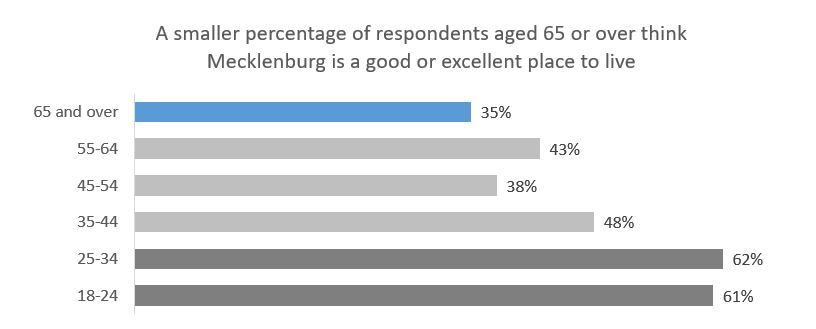Charlotte-Mecklenburg Annual Survey

The Charlotte-Mecklenburg Annual Survey is a tool to help community organizations and stakeholders understand public opinion on a variety of issues that impact them and the region. The UNC Charlotte Urban Institute collaborates with community partners to identify and design survey questions of interest, then conducts a probability-based random sample survey of Charlotte- Mecklenburg residents.
For more than 30 years, the annual survey has helped gauge the pulse of our community in a reliable, data-driven manner. Topics have ranged from the environment to arts, culture and social trust, from the economy to personal values and reactions policies. We offer this collaborative tool to local governments, non-profit organizations and academic researchers as an affordable means to collect high-quality data and analyses of our city and county.
Our modular, collaborative design allows partners to access representative data at a fraction of the cost of multiple surveys conducted separately.
If you would like to participate in the next Annual Survey or have questions about the Institute’s other survey services, contact Kailas Venkitasubramanian.
What is included?
- Question development and refinement to ensure survey data is useful.
- A random-sample telephone (land line & cell phone) survey of 400 Charlotte-Mecklenburg residents.
- An analytical report that includes basic analyses and summary of the data generated from the survey.

Results from a question on the 2017 Charlotte-Mecklenburg Annual Survey
How much does it cost?
Basic costs for partners are typically calculated per question, and vary annually based on vendor and service costs. The approximate price of the first question is $1,400, with subsequent questions priced between $1000-$1200.
Additional research services are also available, including more extensive reports, advanced statistical analyses, or preparation of data for organizational dashboards.
Who can partner?
Any organization interested in gaining insights about Charlotte and Mecklenburg County through a representative sample survey is welcome to collaborate We have typically served non-profit organizations, academic institutions and local government agencies. We welcome organizations and institutions both within and outside Charlotte to partner in the annual survey.
What’s the process?
- The Institute calls for partners for the annual survey through the website and email lists. (If you would like to be added into the list, please contact kvenkita@charlotte.edu). The call will provide more details about costs and timelines for response. You can inquire about the process at any time.
- The survey is designed in modules. Each module is set of survey questions dedicated to the needs of a partner/sponsor. Institute staff will contact interested sponsors to discuss specific data and analytic needs and prepare their modules. If partner modules have similar content, the Institute will work with the partners to possibly combine questions or otherwise maximize the utility of the survey.
- The survey typically measures a set of demographic characteristics. The Institute may add more questions based on partner requirements.
- The Institute conducts the survey and generates an analytical report for each module. The report includes basic summaries of the module, descriptive statistics of module questions along demographic dimensions.
- Partners may request more extensive analyses and reporting as an additional service.
Have any more questions?
Check out the Annual Survey FAQ page.
Past collaborators have included:
● Arts and Science Council
● The Blumenthal Foundation
● Catawba College Center for the Environment
● Catawba Lands Conservancy
● Catawba Regional Council of Governments
● Centralina Council of Governments
● Charlotte Chamber
● Charlotte Regional Partnership
● Council for Children’s Rights
● Foothills Conservancy of NC
● Foundation For The Carolinas
● Gaston Together
● Goodwill Industries – Southern Piedmont North & South Carolina
● Katawba Valley Land Trust
● John S. and James L. Knight Foundation
● The LandTrust of Central North Carolina
● Latin American Coalition
● The Lee Institute
● Levine Museum of the New South
● Meck Ed(Mecklenburg Citizens for Public Education)
● Nations Ford Land Trust
● United Way of Central Carolinas
● Women + Girls Research Alliance